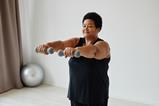Bukky Ayoade believes that summer is the perfect time to look more closely at those all-important numbers such as blood pressure and blood glucose level
We’re halfway through the year and, while summer plans and holidays might be on your mind, it’s also a perfect time to take stock of your health. For many women, particularly those in midlife, a visit to the doctor might not be at the top of the priority list. But there are a few simple checks that could offer valuable insights into your overall health and wellbeing as well as your risk for chronic conditions so it’s important to prioritise these.
Why it is important to know your key numbers
Early detection allows for early intervention, often through lifestyle changes or medication, significantly reducing the risk of future complications. Elevated blood pressure, for instance, can be a silent threat, with no obvious symptoms and so early detection also literally saves lives.
Recently published data from the American College of Cardiology has shown that our heart health declines as we age and menopausal women face cardiovascular risks, highlighting the urgent need for increased awareness and regular screenings.
Understanding your numbers can guide lifestyle adjustments like diets and/or exercise routines to keep you healthy. If your levels are borderline, your doctor or other healthcare practitioner can work with you to manage them and prevent the development of other chronic conditions like diabetes.
Early detection allows for early intervention
Knowing a simple measurement like your hip-to-waist ratio can be valuable in managing weight and reducing the risk of related health issues. Lifestyle change is an evidence-based part of a holistic menopause care plan; knowing your numbers helps understand what you need to work on. Lifestyle change can also help manage menopause symptoms and impact our overall wellbeing as midlife women.
It’s important to not just focus on our physical wellbeing but to have a periodic mental-health check-in as well, as we know the menopause can impact our emotional wellbeing. You can do this yourself, but if you feel you need support then do reach out to your healthcare provider, who should signpost you to relevant resources.
How to get your health checked out:
Doctors/GPs Schedule regular check-ups with your doctor, where they can conduct comprehensive health assessments, including blood pressure, glucose and cholesterol screenings.
Hospitals and clinics Many hospitals and clinics offer health screenings and wellness programmes tailored to specific age groups, providing an opportunity to monitor key health indicators.
Pharmacies Some pharmacies offer free or low-cost health screenings, providing convenient access to basic health checks such as blood pressure and glucose levels.
Portable mobile machines There are machines available to buy that you can use to check your blood pressure and blood glucose (glucometer) in the comfort of your home. You can use a simple tape rule to measure your hip-to-waist ratio (there are videos online to show you how to do this). This is seen as a better measurement than the BMI as it accounts for gender differences.
The key numbers to start checking are your blood glucose, blood pressure, cholesterol levels and your waist-to-hip ratio. If you do these via your healthcare practitioner (HCP) they should have a conversation with you about normal levels and what yours are in relation to them, as well as recommending appropriate interventions if needed. It’s helpful if you also do some research for yourself ahead of any appointments, so you can have an informed conversation and advocate for yourself if necessary.
Getting started
I ensure I have at least a yearly check on my numbers so have set the calendar on my phone to send me a reminder. I also ensure I attend all screening tests I am sent reminder letters for. Recently I have had breast and bowel screening tests, which have thankfully come back clear. We are lucky to have some of these tests as routine in the UK.
It’s also crucial to listen to our bodies so we pick up if things are not as they should be. A suggestion could be to create a personal health checklist before any appointments. This list should include any questions you have about recent aches, symptoms, changes in energy levels or anything else that’s been on your mind health-wise. It can help you be organised and ensure that you don’t forget to bring anything up with your healthcare practitioner at your appointment.
As summer is here, I hope you are also planning to spend more time outdoors – just remember your sunscreen! If you are a gardener that could give you a great workout. Seize the opportunity of the warmer weather to help improve your numbers – and your overall sense of wellbeing.
Being aware of your key health numbers will help you to make informed decisions about diet, exercise routines and your overall lifestyle, which can help with menopause symptoms and the journey to a vibrant midlife. Talk to your doctor, get screened and make this mid-year your turning point towards a healthier, happier you!
Next issue, you will hear from Jo Ibbott, executive coach and menopause coach at courage-coaching.co.uk and founder of menopause hub, What The Fog?
Helpful resources
NHS advice on bone health: nhs.uk/live-well/bone-health
NHS general menopause advice: nhs.uk/conditions/menopause/help-and-support
NHS Live Well advice on healthy living: nhs.uk/live-well
NHS mental health information and support: nhs.uk/mental-health
Women’s Health Concern’s emotional wellness in menopause factsheet: womens-health-concern.org/wp-content/uploads/2023/06/30-WHC-FACTSHEET-Emotional-wellness-in-menopause-JUNE2023-A.pdf
Women’s Health Concern’s menopause wellness hub: womens-health-concern.org/help-and-advice/menopause-wellness-hub


































No comments yet